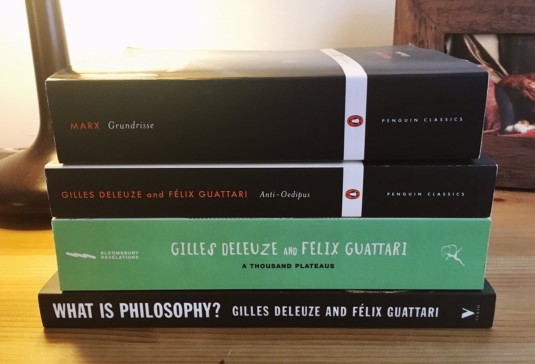
Do you keep a reading list?
Michael Bloch, Closet Queens: Some 20th Century British Politicians (Abacus 2016)
Rosi Braidotti, Transpositions: On Nomadic Ethics (Polity 2006)
Rosi Braidotti, The Posthuman (Polity 2013)
Rosi Braidotti, Posthuman Feminism (Polity 2017)
Claudio Celis, The Attention Economy: Labour, Time and Power in Cognitive Capitalism
(Rowman & Littlefield International 2016)
(Rowman & Littlefield International 2016)
Nick Cohen, What's Left?: How Liberals Lost Their Way (Harper Perennial 2007)
David Cole, Engines of Liberty: How Citizen Movements Succeed (Basic Books 2017)
Aeron Davis, Reckless Opportunists: Elites at the End of the Establishment (Manchester
University Press 2018)
University Press 2018)
Jodi Dean, The Communist Horizon (Verso Books 2012)
Jodi Dean, Crowds and Party (Verso Books 2016)
Dhruv Jai (ed), Deleuze and Marx (Edinburgh University Press 2010)
Peter Dorey, British Conservatism: The Politics and Philosophy of Inequality (I.B. Tauris
2010)
2010)
Kareem Estefan, Carin Kuoni and Laura Raicovich (eds), Assuming Boycott: Resistance,
Agency and Cultural Production (OR Books 2017)
Agency and Cultural Production (OR Books 2017)
Mike Featherstone et al, The Body (Sage 1991)
Rob Ford and Matthew Goodwin, Revolt on the Right (Routledge 2014)
Anthony Giddens, The Nation State and Violence (Polity 1985)
Elizabeth Grosz, Volatile Bodies (Indiana Uni Press 1994)
Donna J Haraway, Staying with the Trouble: Making Kin in the Chthulhucene (Duke
University Press 2016)
University Press 2016)
Michael Hardt and Antonio Negri, Assembly (Harvard 2017)
Bob Jessop, State Power (Polity 2007)
Lois McNay, The Misguided Search for the Political (Polity 2014)
Lois McNay, The Misguided Search for the Political (Polity 2014)
Tom Mills, The BBC: Myth of a Public Service (Verso Books 2016)
Johanna Montgomerie (ed), Critical Methods in Political and Cultural Economy (Routledge
2017)
2017)
Kieron O'Hara, After Blair: David Cameron and the Conservative Tradition (Icon Books
2007)
2007)
Camille Paglia, Free Women, Free Men: Sex, Gender, Feminism (Canongate Canons 2018)
R A W Rhodes and Paul T Hart (eds), The Oxford Handbook of Political Leadership (OUP
2016)
2016)
Tim Ross and Tom McTague, Betting the House: The Inside Story of the 2017 Election
(Biteback 2017)
(Biteback 2017)
Mike Savage, Social Class in the 21st Century (Pelican 2015)
Roger Scruton, Thinkers of the New Left (Longman 1985)
Guy Standing, The Precariat: The New Dangerous Class (Bloomsbury Academic 2016)
Max Tegmark, Life 3.0: Being Human in the Age of Artificial Intelligence (Allen Lane 2017)
Mariano Zukerfeld, Knowledge in the Age of Digital Capitalism: An Introduction to Cognitive
Materialism (University of Westminster Press 2017)
7 comments:
Hey, you seem to be preparing yourself for a Deleuzian-turn? D&G’s Notes Towards a Minor Literature and Nicholas Thoburn’s, application of this to the social, Minor Politics are well worth a read. If I recall, Thoburn has a chapter about the relationship between Deleuze and Marx as well as an analysis on the Wobblies.
Simon Jenkins, Thatcher & Sons
Claudio Celis, The Attention Economy: Labour, Time and Power in Cognitive Capitalism
(Rowman & Littlefield International 2016)
This one looks like the place to start.
Only a Deleuzian turn of sorts. I'm interested because, well, his work is interesting. Very useful I think for thinking through politics and its relationship to capitalism (in conjunction with Marx, obvs)
I've read the Guy Standing. It's a quick read. I would counterpoint it with Kevin Doogan's "New Capitalism" which has a completely different analysis of the precariat.
And the Grundrisse is bloody hard going...
Anti-Oedipus and A Thousand Plateaus are the kind of books that really lend themselves to reading groups. Especially when you are aiming to read them in relation to your own lives and current political problems. Reading groups on Capital and a Thousand Plateaus formed my politics more than any other reading.
Part of the difficulty in engaging with Deleuze and Guattari is the Deleuze studies industry that sprang up in the 2000s continued the 80s and 90s Anglo reception of French theory as tools for liberals to attack or ignore Marx. Which was why Guattari has been pushed into the background.
I don't know if you've read much Lazarrato but he is probably closest to the spirit of D&G's actually political project today. He is also a useful companion/counterpoint to the weaker parts of H&N's immaterial labour/social production theories (although I still find these very useful). In a recently interview he critiques his own engagement with the immaterial labour thesis because, in comparison with earlier class composition analysis it is too sociological and not understood from the perspective of rupture in the way that the mass worker was understood from the perspective of the refusal of work, for instance.
Cheers for that. Didn't know Lazarrato's stuff, so it will be placed on order!
Post a Comment